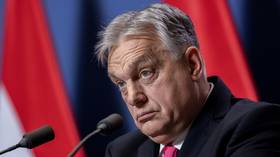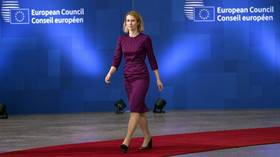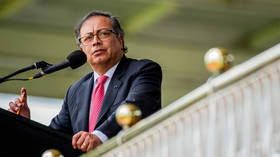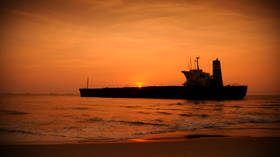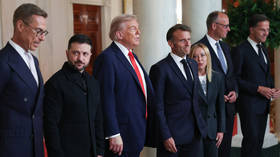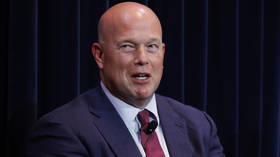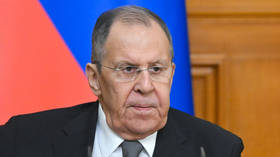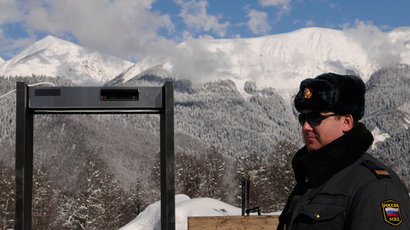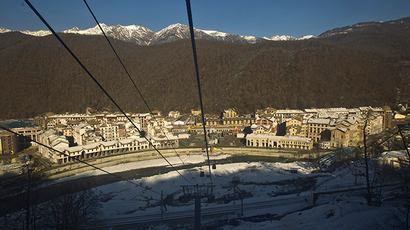Sochi Olympics: Vladimir Putin's interview with world media in full
Transcript of the interview of Vladimir Putin, President of the Russian Federation, to Channel One, Rossiya-1, ABC News, BBC, CCTV television channels and Around the Rings agency.
[The text of the interview comes as published at http://kremlin.ru]
Vladimir Putin: I believe that you know everything about the coming Olympics and I am wondering what else I can tell you. Or, maybe, you do believe that you know everything so I could hardly make you change your mind. But a chance still exists and I am taking this opportunity to talk to you with great pleasure.
Ed Hula:I have been traveling to this city for eight years and I am witnessing sweeping changes here – a whole new cluster has been constructed in the mountains with sports arenas, stadiums, various trails, including a biathlon range. A great deal of money has been put into Sochi to host the Olympic Games; according to the estimate, 50 billion dollars. But we have not had a chance to know the exact amount yet and to understand how much the Olympics cost. Well, how much are they? And are they worth that money? What benefits will these Games bring?
Vladimir Putin: The overall cost of the Olympics has been announced; it is 214 billion rubles. You can calculate the dollar amount dividing this figure by 33 which is a current exchange rate.
But that is not what I want to tell you here. I want to begin with what we scheduled to do before the Olympics in 2006/07 when we adopted the Sochi Development Master Plan. Looking at the map of the Russian Federation, one can see a country covering mostly northern areas; today more than 70 percent of our territory is or can be referred to as northern, if not the Far North. We have a rather small warm Black sea strip in the South and – to tell the truth – quite a few regions with a hospitable warm climate. And so far we have had no contemporary resorts the Russian people could enjoy throughout that huge area. Today we are at the top of the list of those traveling on holiday abroad. As far as I know, Russians are the first among tourists going to Turkey; last year three million Russians visited that country, although its climate zone is almost the same as the one of the Black sea region. Therefore, we have had an important task to develop an infrastructure in this region of the Russian Federation. And again, to this end we have adopted a special program. But as usual there is not enough money to deal with what seems to be of the first importance; however, it is true both for Russia and any other country in the world. And when it comes to the resort development activity which is never seen as a priority, there is never enough money. Therefore, in fact our goal was to address a few tasks at one time.
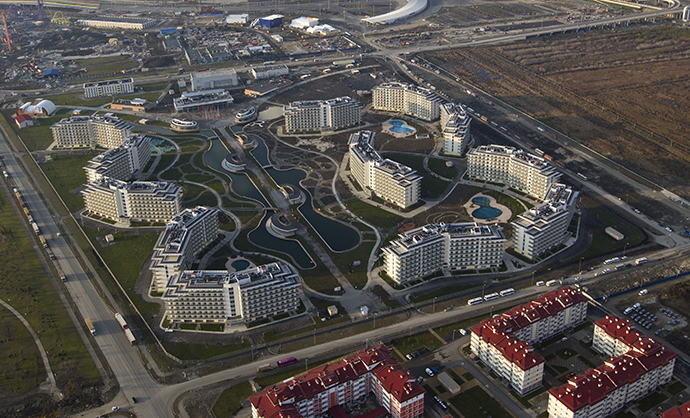
The first and the most important one was to develop the South of the country, and primarily its infrastructure. And – to my mind – we have made real progress here since a completely new transport, energy and environment infrastructure has been set up. In terms of current emissions into atmosphere and those of 2007, today when the project is nearly over the amount of air pollutants is half its 2007 amount. We have achieved that result due to the use of a more eco-friendly fuel in electric power sector, two new gas pipelines and eight or nine electrical substations, as well as a cleanup of two constantly fuming dumps in the area of greater Sochi and a new transport infrastructure. All those measures helped to ease the environmental burden. Let’s admit that it is crucial for a resort.
The second task we were focused on was to re-establish training bases for high-ranking athletes. After the collapse of the Soviet Union Russia lost nearly all its training facilities in middle-altitude mountains. All of them are not ours anymore; they are either Georgian or Armenian, or Kazakhstani, I mean the Medeu skating rink. It is shameful and embarrassing but our ice skating professionals had to hold the Russian national championship in Berlin due to the lack of appropriate skating rinks. Then, we also lost all facilities related to ski jumping. Today we have built a few centers, some of them beyond Sochi. But two new Sochi ski jumps are totally unique in a technical sense; for the purposes of Olympic training we have also constructed the most sophisticated ski jumps in some other regions.
Finally, the third task was to create a new mountain cluster in order to transform this part of the Russian Federation into a resort which can be used in any season, in winter and in summer. I think that we have accomplished this task as well. Therefore, if we consider only the preparations for the Olympics, they cost 214 billion, as just 15 sport facilities have been built, while most of the money was spent on infrastructure. If we take into account some expenses associated with the development of relevant infrastructure, the sum may be larger, but those expenses are not directly related to the Olympic Games.
Sergey Brilev:Vladimir Vladimirovich, you have just called the ski jump a unique facility. But it is unique not only from the sports and technical point of view. The foreigners are very unlikely to know about the question: Where is Mr. Bilalov? Your visit to the jumping facility and request to get explanation of how various parts of the mechanism function. Mr. Bilalov was severely punished in front of the entire nation. Did it frighten the others so as to push them to fulfill their promises? And in general how do you feel about it?
Vladimir Putin: First, let me finish the answer to Ed's question. Public investments make up 100 out of 214 billion, the rest is provided by private companies. This money is primarily put in hotel infrastructure. By the way, we have built more than 40,000 (between 41,000-43,000, as far as I know) brand new hotel rooms, which is a crucial component of resort development. That is where private investments of our companies have been allocated.
As for the missed deadlines, well, we both understand that over the past several years the Sochi Olympic project has been the largest construction site in the world. Without exaggeration, the biggest building site on the planet. And it is only natural that some problems would come up given the scale of the project and, frankly, lack of experience of such large-scale construction projects in our country, in modern Russia. Certainly, we had to enter into unpleasant discussions on prices, deadlines and quality of work. It could not be otherwise. Absolutely impossible! Constant praise would have brought us nowhere. My job is not only to give medals, you know, which certainly is part of my function. First and foremost, though, my job is about ensuring success of the work in various spheres. It is a kind of day-to-day spadework. In which part of the world have you ever seen builders who meet all the deadlines and provide high-quality work at the lowest price? Just give me at least one country. Not a single country in the entire world. We see the attempts to overvalue facility prices everywhere – in Europe, North America, Asia. Same story everywhere.
However, this struggle between the customer (in this case, it is either the state or the private sector that has build hotels here) and the executing agency, the contractor, is quite common. Contractors always pursue large profit, the customer – a high-quality end product in due time and at a lower cost. This struggle never ends, but this is natural. Obviously, there is the limit beyond which the struggle is criminalized, but it is under the mandate of the law enforcement bodies to control that, and they have shown tough and good work here. We have tried to prevent anyone from crossing this limit. All in all, I think we have managed it.
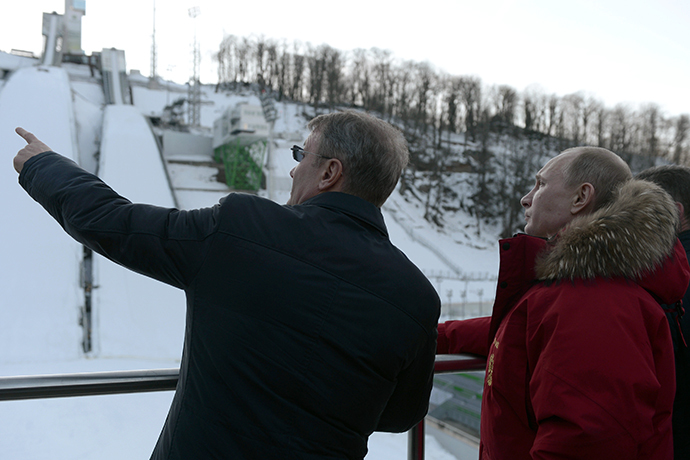
As for this specific case, yes, the Russian Sberbank has taken up this project and accomplished it providing excellent quality and modern solutions. There are no other jumping facilities like that in the world.
George Stephanopoulos:It was said that the issue of corruption is really serious: 18 billion dollars were plundered, the Swiss said, is it true or not?
Vladimir Putin: First, the Swiss did not say that. Of course, we are not uninterested in what our partners say in the world, especially, in the Olympic movement. I have seen the verbatim report of his meeting with some journalists, your colleagues tried to drag him to this topic, and I understand journalists, it is their work – always drag out “hot” topics. But the Swiss specialist, the President, as I understand, of the International Ski Federation, he did not say that, as it seemed to me in the report, this is the first.
Second, if anyone has concrete data on instances of corruption related to the implementation of the Sochi Olympics Project, we ask to furnish us with objective data. We will be glad and grateful and we will use this information to put things right in this sphere.
What are instances of corruption? In this case they mean theft of public funds with the help of state officials, in whose hands these funds fall. If anyone has such information, give these findings to us, please. I repeat once again, we will be grateful. But besides talk, no one furnishes us with anything. We understand and know and are even used to it, there are always some forces which are always against everything, even the Olympics project. I do not know why, but, probably, it is their job, probably they are inclined to it, somebody offended them in their life. But if there is objective data, give it to us, please, as soon as possible. For the moment we do not have it, nobody gives it. Our law-enforcement bodies work on this issue. There were cases, I have already talked about it, some years ago local officials tried to trade land designated for Olympics venues. An investigation was conducted; people were convicted by the Russian court and are serving the sentence. We have not seen any big, large-scale instances of corruption in the framework of the Sochi Project implementation. There are things I have already talked about, there are attempts of executives, contractors to drive up the price. But this, I repeat, is going on in all countries of the world, and our task is to decrease it and achieve good quality of the project and compliance with the deadlines of construction. Combat always goes on, you understand, we always speak about it in public, and always in this regard even fuel rumors about corruption. What should we do? Either always keep silent about it, or not to be afraid of such reaction and work openly. We chose the second way. If we see that there are some problems anywhere, we speak about it in public.
Well, that is my comment on this issue. I do not see serious corruption for the moment, but the question related to the overstatement of the construction volume exists. You know, I can give another comment on that. What are the reasons of construction overstatement?During tenders and competitions bidders for this or that project often lower the cost of the project on purpose, in order to win the project. As soon as they win, they understand that they cannot manage with these prices and start to increase them. It happens almost everywhere as well. Our case is not unique. In this regard we can speak about the level of holding tenders, probably. But this price increase, it is sometimes connected with deliberate acts of contractors, and sometimes with the lack of efficient professional estimates of necessary investments, especially in mountain conditions, in conditions of a mountain cluster.
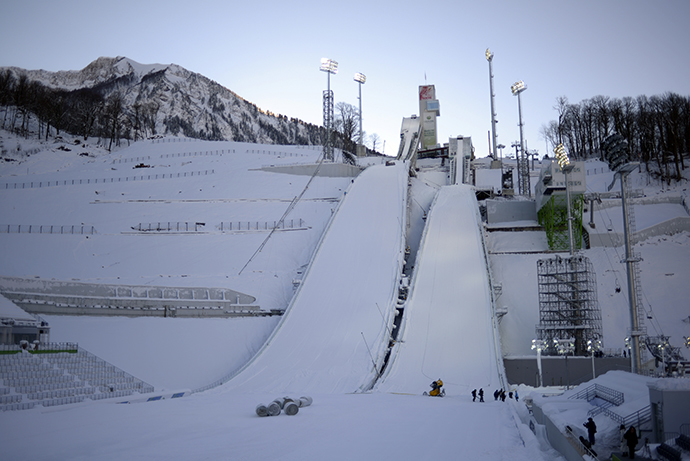
The Caucasus Mountains are young mountains, and there are a lot of problems related to seismic activity, a lot of problems with landslides, etc. All these things sometimes have not been estimated expertly and promptly at the initial project price evaluation. There are such moments, but this is not corruption.
Andrew Marr:Mr. President, now the British people are thinking of going to France or Switzerland to ski, and you want to persuade them to go to Russia to ski. If they go, how difficult it would be to get visa? Unilaterally, can you without any agreement with the European Union, without negotiations with the EU, undertake steps to relax the visa regime, simplify visa receiving and entry?
Vladimir Putin: As far as the Sochi Olympiad guests are concerned we took a unique decision and its unique character is in the situation that the Olympiad guests, the tourists coming to the Olympiad can come to the Sochi Olympic games without visas, just on the basis of accreditation. And they can get this accreditation at special windows open in all our diplomatic missions. But they don't need any visa first.
Secondly, we consider that in recent years we have built a unique site from the point of view of its ski piste mileage (150 kilometres) and as I mentioned more than 40 thousand hotel vacancies. Look, may be it is necessary to upgrade more the service quality, but in general the material base created here is very good for a big tourist centre of world class. I think that it will be very interesting to see - even for those who will not be able to come to the Olympiad - what is Sochi where the Olympiad took place. People over the world always show this interest in the Olympic games sites and we will be glad to see the winter sports fans coming to Sochi to look what Russia did here, how it put into practice this project. And if anyone likes it, this place may become a favourite resort for our friends from the United States or Europe, or Asian countries, including China, why not? We should not forget that people who love winter sports like to see different places, they go with pleasure to Canada, the United States, Switzerland, Italy or France and I hope will come to Sochi.
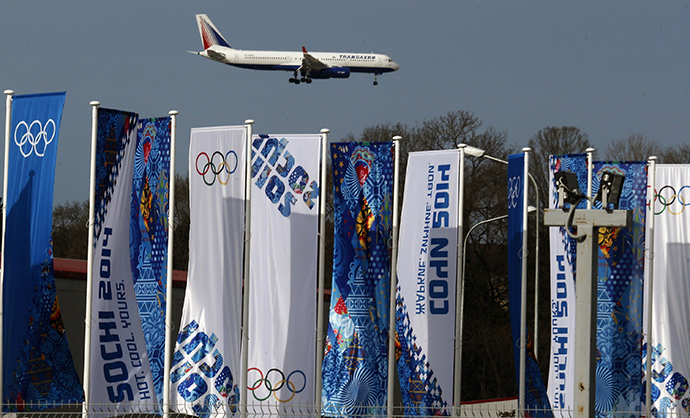
Now, let me say two words about visas. We offer exclusions for some tourist routes. For example, tourists coming by water transport may enter Saint-Petersburg without visa. We offer other exclusions as well. But we are talking about exclusions anyway while the general regime is as follows: all visa and visa-free access matters are regulated in the world on the basis of reciprocity. And we would like very much to reach an agreement on this visa-free access regime with our colleagues from the European Union. On many occasions I have already mentioned that the European Union has a visa-free access regime with a number of Latin America countries where the criminal situation is not better - and in many cases is worse - than in the Russian Federation. And where is Latin America, and where is Europe? If we look at Russia and Europe, they are too close from my point of view. Are not they?
That is why it seems to me that we should agree on a visa-free access regime in general. And as far as some exclusions are concerned, we may talk about some separate events.
Irada Zeynalova:Vladimir Vladimirovich, at the beginning of December you paid a three-days visit to Sochi with an inspection of Olympic sites. And you mentioned then that we should speak now not about the work done, but about the work that should be done, about the unfinished work, you stressed that it needed polish. Can we say that now everything is ready, what do they report to you? Where the difficulties were the most serious and what still has to be done if there is still such a case?
Vladimir Putin: Everything is already done and now we have to put it in order. We have to get hotels functioning well, we have to evacuate the construction equipment, we have to remove the construction waste that is to get ready to receive guests as any landlords and landladies do before receiving visitors. We have to get ready to receive guests in such a way that everything becomes beautiful and reflects the spirit of the event itself, that all sites become ready. As you know, they have already accepted many test competitions: some stages of the World Cup and other big international events. Competitors, our guests, specialists in general were satisfied and stressed the high degree of readiness a year ago - now all sites are finished.
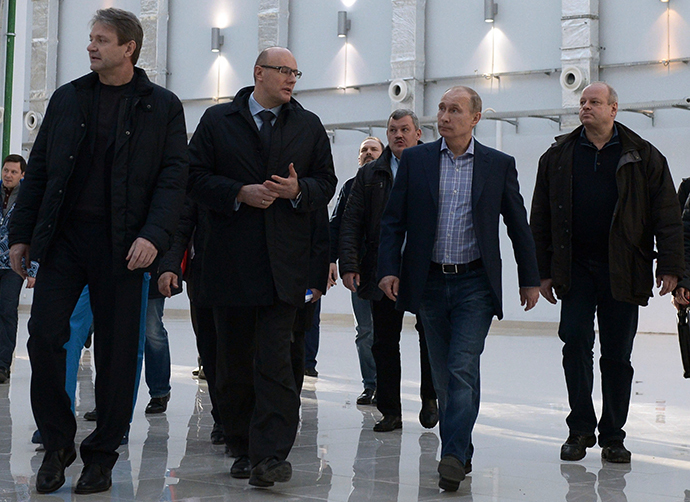
Junyi Shui:Mr. President, before I put my question I would like to say this is the fifth interview in 14 years, sometimes I did it face to face, sometimes together with my colleagues. You are very popular in China. Before my coming here I said to our Internet users at Central TV that I was going to Russia to interview you. And as soon as I published this message two million users put an "I like it" mark next to it and sent many questions.
You have just mentioned that you invite tourists from different countries to come to Sochi. And what do you think about the Chinese investors coming after the Olympic Games to build hotels? What opportunities are there for Chinese investors in this situation?
Vladimir Putin: First of all, I would like to convey my best wishes to all my friends in China both through social networks and through other media. I know that I have many friends in China. It is not surprising, because we have a special relationship with China. And I have special feelings for China. China is a great country with a great culture, with very interesting, hard-working and talented people.
Give them a big thanks for such an attitude. This is a mutual feeling.
As far as investors are concerned, we will welcome investors from all countries, including from China. China has great investment potential. China is a country with the largest gold reserves. There are very good tools for investment in China, including a whole network of major funds. The Russian investment fund, the RDIF, works with some of these funds, with the largest Chinese investment funds. They already have joint projects.
Generally, it is quite difficult for foreign investors to find the most effective ways of investing their capital, which are efficient and well-protected at the same time. They often do it together with the relevant national bodies. Such a body, I have just talked about it, the RDIF, works with our Chinese partners, it can work in any region of the Russian Federation and in all areas.
If the Chinese partners will be interested in the tourism cluster in the south of the country or, say, the agriculture cluster, we have it here, near the Krasnodar and Stavropol regions: these are the neighbouring regions, for example, the Rostov region – this is our breadbasket, as we call it, these are the regions where agricultural production is particularly well developed, the climate here is very good. But in some regions, for example, in the Rostov region, which borders the Krasnodar region, the machine-building industry is also well-developed, the aviation cluster is developing, and in many of these areas we have promising, very interesting joint plans with our Chinese friends. That is why we invite them not only to Sochi and the Krasnodar region, but also to the southern part of the Russian Federation as a whole.
Irada Zeynalova:Mr. Putin, at all times and in all countries the Olympic Games have attracted extremists wishing to make a global name for themselves. Unfortunately, in the context of the recent terrorist attacks and threats in the south of Russia, we have to discuss that in relation to Sochi. Several agencies are working to ensure security of the Games, and European and American experts have offered their assistance. What reports do you receive regarding the scope of the threats, regarding what we are already confronting and what we will have to confront?
Vladimir Putin: You are right, extremists are always trying to make a name for themselves, especially in the run-up to some major event, and not only sports events, but also political ones. You know very well what security measures were taken during the meetings of the Heads of State within the framework of the Group of Twenty, the G8 or other forums, for example, APEC in the Asia- Pacific region. The same applies to major sports events. I have already spoken about this, and I want to repeat that extremists are usually narrow-minded people who do not realize that even if they, as they think, set themselves noble goals, by committing terrorist acts they are drifting further and further away from achieving those seemingly noble goals to the extent that these goals stop being relevant. The whole world considers them criminals, criminals in the worst sense of this word, bloodthirsty people who not only disregard human rights and freedoms, but also set a person's life at naught. No matter what motives they have for committing such acts, there will never be excuses for them, and in the eyes of all sensible people in the world they will always remain criminals. Therefore, they immediately cast a criminal shadow on the goals they set for themselves. But the world is what it is, we remember well the tragic events during the Olympic Games in Munich, when the Israeli sports delegation was killed almost in its entirety. And of course, since that time all countries in the world without exception make special, extraordinary security efforts.
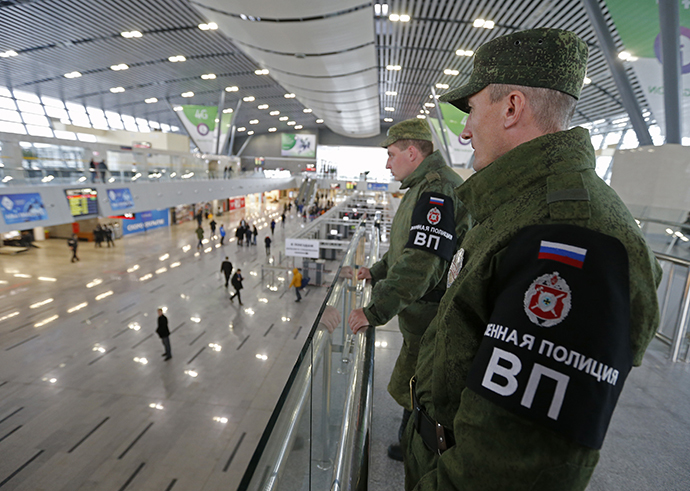
We do everything with the understanding, with a clear understanding of the operational situation developing around Sochi and in the region as a whole, we have a perfect understanding of what it is, what is that threat, how to stop it, how to combat it. I hope that our law enforcement agencies will deal with it with honor and dignity, just as it was during other major sports and political events.
Irada Zeynalova:I worked as a correspondent at several Olympic Games, including the London ones, the last Olympic Games. And when we got there, we found out that Patriot missile launchers had been deployed on the roofs of houses in the North and East London. At first it certainly came as a shock like military ships anchored in the bay near Greenwich. But the British government explained: "The threat is massive, we will resist it, and it is a necessity." So that is exactly what happened – Patriot missile launchers were in place. Are we going to see something like that in Sochi?
Vladimir Putin: I hope you will not see anything, but we will do our best. As for London, we remember that one of the G8 summits there saw a number of terrorist attacks, including in the tube. I remember the painful reaction of the then British Prime Minister Tony Blair to the attacks, and I remember how we all provided him moral and, if necessary, special support. As an aside, now I also want to thank all our partners from North America, the United States, Europe, and Asia which engage in very active cooperation with their Russian counterparts in the law enforcement bodies and special services. Such joint work is ongoing.
Junyi Shui:Mr. President, Volgograd saw two terrorist attacks a month before the opening of the Sochi Olympics, and many people have some concerns about the sport event. We are convinced that Russia will be able to take even more serious security measures. But might they affect athletes and other participants?
Vladimir Putin: I would not want these acts of terrorism – crimes of the kind aimed at undermining international cooperation in the political, as well as, so to say, in the humanitarian area, including sports – to affect the upcoming activities. For if we allow ourselves to show weakness or fear, then we will assist terrorists in achieving their goals. I believe that the international community working in all areas – humanitarian, political, as well as economic – should unite to fight such inhuman phenomena as terror attacks and the murder of totally innocent people. We are the organizers, so our task, of course, is to ensure the safety of participants in the Olympic Games and its guests, and we will do our best.
Ed Hula:Mr. President, how do you plan to ensure an adequate level of security at the Olympics, and yet make it a happy and joyous occasion?
Vladimir Putin: Answering your colleagues’ question I have already said that we will try to make sure that security measures do not seem an imposition, are not too conspicuous and do not put pressure on the athletes taking part in the Olympic Games and the guests and journalists present there. But at the same time we will do our best to make these measures effective.
Security is to be ensured by some 40 thousand law enforcement and special services officers. Of course, we will draw on the experience acquired during similar events in other regions of the world and in other countries. It means that we will protect our air and sea space, as well as the mountain cluster. I hope that it will be arranged so that it will not be evident and, as I have already said, will not, so to say, depress the participants in the Olympic Games.
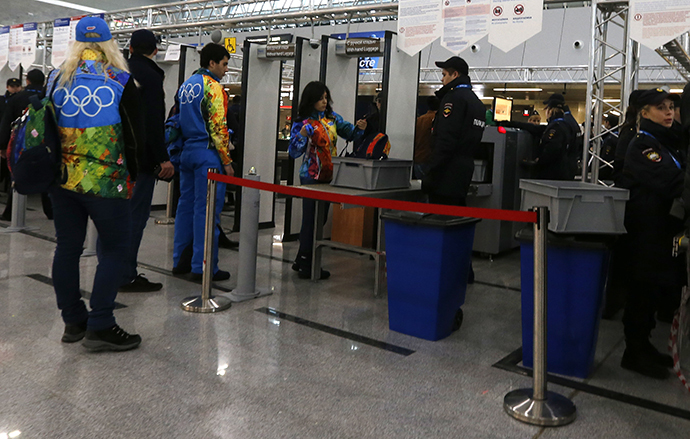
I would also like to note that a special regime for movement of people and goods was introduced in the Greater Sochi area on 7 January 2014. We have round-the-clock headquarters to ensure security – I want to emphasize that it is round-the-clock – which coordinates the work of our law enforcement agencies and special bodies and maintains contacts with its counterparts abroad.
George Stephanopoulos:Mr. President, let me change the subject. I apologize. Some Americans going to Sochi have even developed their own plans for evacuation in case something happens. Are not you concerned that if something similar happens in other parts of Russia, these plans will be implemented?
Vladimir Putin: Russia is a big country, and, like in any other country, different things happen. We are working towards ensuring security in Sochi, using a lot of forces and means, but mostly those not employed in guaranteeing security in other regions of the Russian Federation. We have enough of such means provided by the Federal Security Service, the Ministry of Internal Affairs, and army units, which will be used in ensuring security too, as I have already said, in the maritime area and airspace. If anybody feels it is necessary for them to design separate plans for guaranteeing their own security, it is okay as well, but, of course, it needs to be done keeping in touch with the Olympic Games organizers and our intelligence agencies. As I have already said, we have permanent round-the-clock headquarters maintaining contact with colleagues from the foreign countries’ corresponding services and army units. By the way, these colleagues are represented in the headquarters, there is, I repeat, a direct professional interaction. If necessary, all these mechanisms can be used. I hope that it won’t come to that. I have also already mentioned the way we performed quite well, say, holding important political events, including both G20 and G8 summits, and hosting major international competitions, like, for example, the recent World Championships in Athletics in Moscow. Understanding the full scope of our security sphere problems, we still have great experience in staging events of the kind, and we use it.
Andrew Marr:A lot of British politicians and celebrities, including Elton John, express concerns over the attitude towards homosexuals in Russia. I would like to ask you, do you think there are fundamental differences between the attitude towards homosexuals in the West and in Russia? Do you think homosexuals are born or made? And what does the concept of propaganda imply, is it philosophical?
Vladimir Putin: You know, I am not in a position to answer the part of your question concerning homosexuals being born or made. This is beyond my professional interest, and I just can’t give you a qualified reply. And as I can’t give you a qualified reply, I would just prefer to leave it at that. And as for the attitude towards individuals of non-traditional sexual orientation, yes, I can give you quite a detailed reply. I would like to draw your attention to the fact, that in Russia, as opposed to one third of the world’s countries, there is no criminal liability for homosexuality. 70 countries in the world have criminal liability for homosexuality, and seven countries out of these 70 enforce the death penalty for homosexuality. And what does that mean? Does it mean that we should cancel all major sport events in those countries? I guess not.
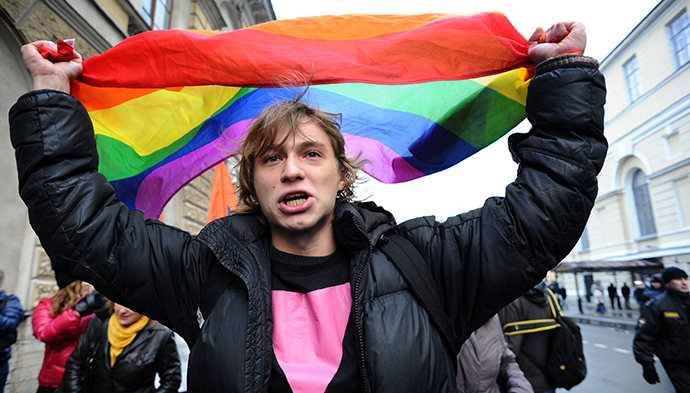
The Soviet Union had criminal liability for homosexuality, today’s Russia doesn’t have such criminal liability. In our country, all people are absolutely equal regardless of their religion, sex, ethnicity, or sexual orientation. Everybody is equal. We have recently only passed a law prohibiting propaganda, and not of homosexuality only, but of homosexuality and child abuse, child sexual abuse. But this has nothing in common with persecuting individuals for their sexual orientation. And there is a world of difference between these things. So there is no danger for individuals of non-traditional sexual orientation who are planning to come to the Games as guests or participants.
Andrew Marr:And as for the Orthodox Church, it calls for returning criminal liability for homosexuality. What is your opinion about that?
Vladimir Putin: According to the law, the church is separate from the state and has the right to have its own point of view. I would also like to draw your attention to the fact that almost all traditional world religions are in full solidarity on this topic. And is the position of the Holy See different from that of the Russian Orthodox Church? And does Islam treat individuals with non-traditional sexual orientation in a different manner? It seems so, but this other position consists in a much tougher approach. Those 70 countries I have mentioned mostly belong to the Islamic world, and the ones enforcing death penalty all have Islam as state religion. Thus, there is nothing strange in the Russian Orthodox Church’s opinion as compared to that of other traditional world religions, there is nothing strange in that, but I repeat once again: the opinion of the church is one thing, and the opinion of the state is another thing. The church is separate from the state.
Sergey Brilev:Vladimir Vladimirovich, perhaps, to add to the issue. You know, once I was lucky to meet the smartest and the most beautiful girl, and I have been married to her for a long time, well, generally speaking, my sexual orientation removes me a bit from being able to discuss this issue, but the thing is as follows.
All Russians of non-traditional sexual orientation, who I know, ok - not all, but the vast majority are people with excellent careers, who have never in their life-time faced any job restrictions and so on, though against the background of our bill to ban gay propaganda among minors, our country is getting the reputation of being just about the most anti-gay country on the planet, however, to a certain degree quite the opposite.
Vladimir Putin: It is not getting the reputation, there are attempts to create it.
Sergey Brilev:Yes, I agree. I wonder whether we should review this bill causing all the fuss that has, actually, little to do with its name or content, and to adjust it a bit? Probably with a view to offering not less sex education needed for children, but less sex, in general, available to minors, no matter if it is homosexual or heterosexual, what would be demanded by many people who are quite heterosexual. Or, probably, to really examine this notion. Frankly speaking, I have never come across gay propaganda among minors. Basically, I agree that I do not understand what it is in practice.
Vladimir Putin: Why so? Could you read the bill thoroughly, and pay your attention to its name. The bill's name is "Ban on propaganda of pedophilia and homosexuality". The bill banning pedophilia, propaganda of pedophilia and homosexuality. There are countries, including European, where public discussions – I have just talked about this at the meeting with volunteers – for instance, on the possibility to legalize pedophilia currently take place. Public discussions in parliaments. They may do whatever they want, but peoples of the Russian Federation, the Russian people have their own cultural code, own tradition. It's not our business and we do not poke our nose into their affairs, and we ask for the same respect for our traditions and for our culture. My personal view is that the society should look after its children at least to be able to reproduce and not only thanks to migrants, but on its own base. We achieved what we had not experienced for a long time. In 2002, 2003, 2004 it seemed that we would never redress that absolutely terrible situation we had with the demographic crisis. It appeared that it was a demographic pit that would prove to have no bottom and we would continue investing in it endlessly.
And at that time we developed and adopted a program aimed at supporting demography, to increase birth rates in the Russian Federation. Frankly speaking, I was much worried myself: we allocated a big volume of resources, and many experts used to tell me: "Don't do this, anyway, there is such a trend, which is experienced by many European countries. And we won't avoid it as well". This year in Russia, the number of newborns has exceeded the number of deceased for the first time. We achieved a specific positive result. If anybody would like to focus on, so to say, developing the cemetery, they are welcome. But we have different goals: we want the Russian people and other peoples of the Russian Federation to develop and to have historical prospects. And we should clean up everything that impedes us here. But we should do this in a timely and humane manner without offending anybody and without including anybody in a group of secondary people.
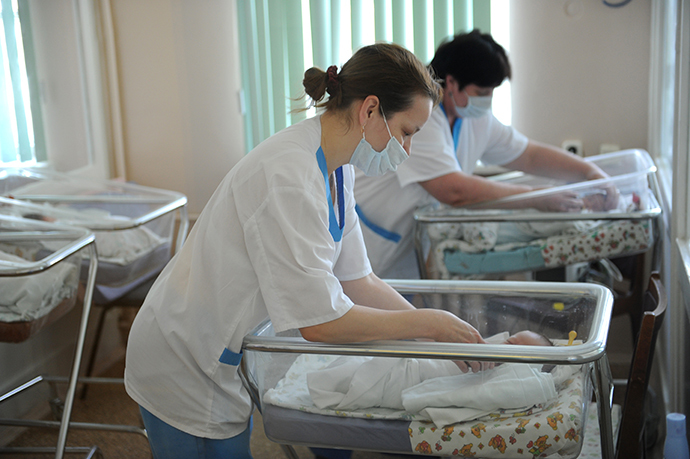
It seems to me that the bill we adopted does not hurt anybody. Moreover, people of non-traditional sexual orientation cannot feel like inferior people here, because there is no professional, career or social discrimination against them, by the way. And when they achieve great results, such as, for instance Elton John achieves, who is an extraordinary person, a distinguished musician, and millions of our people sincerely love him with no regard to his sexual orientation, and his sexual orientation does not affect attitudes to him, especially as to a distinguished musician. I think that this quite democratic approach to people of non-traditional sexual orientation alongside with measures aimed to protect children and future demographic development is optimum.
Junyi Shui:I also would like to proceed on discussing this issue of homosexuality.
Irada Zeynalova:And I would like to ask why we are discussing this issue in the context of Sochi when we gathered to speak about Sochi?
Junyi Shui: But I would like to continue.There were talks that the snow of 2014 in Sochi would be lonely because many Western countries spoke about homosexuality, about oppression of homosexuals in Russia, and those messages reached China. By the way, in 1980 there were also attempts to boycott the Soviet Olympic Games in Moscow for different reasons, and it was the same case at the Beijing Olympic Games. Why do such voices appear when a country is developing, for instance, China is developing, Russia is developing? What do you think, may be these are manifestations of the "cold war"?
Vladimir Putin: I don't think that these are manifestations of the "cold war", but it is a demonstration of competition. When such a powerful country, potentially powerful country as China starts showing rapid pace of growth, it becomes a real competitor in global politics and in the global markets, and, of course, tools to restrain such growth are switched on. Probably, you know that once Napoleon said that China was sleeping, and let it sleep as long as possible. This is a traditional attitude of Western Civilization towards the East, and towards China, in particular. But China has awakened. And I think that the right option to develop relations with such a big, potentially powerful and great country as China is to search for shared interests, but not to restrain. I believe that some old approaches towards Russia still exist from the perspective that there is a need to restrain something.
And as for the issue that we cannot leave, I would like to say the following. I explained that homosexuality is a criminal offence in 70 countries. The same is in the USA. It is still a criminal offence in some states of the United States, for instance in Texas, and may be in another three states. But what the heck, we shouldn't hold any international competitions, should we? Why does nobody speak about this and why do they speak about us, though we do not have criminal liability for this. What is this, if not an attempt to restrain? This is a remnant of the previous, old way of thinking and this is bad.
It is even worse when it comes to major sports events, especially Olympic Games. I know what many top US politicians that I respect and that are respected across the world think. They believe that the boycott of the Moscow Olympics, for all the serious grounds it had — I mean the introduction of Soviet troops in Afghanistan — was a great mistake even in those circumstances. Indeed, any major international competition, and Olympic Games first and foremost, are intended to depoliticize the most pressing international issues and open additional ways to build bridges. It is unwise to miss such opportunities, and it is far more unwise to burn such bridges.
Ed Hula:President Obama has appointed Billie Jean King and other members of the delegation who would represent the United States in Sochi. There are homosexual athletes. Do you believe it to be a political component of the Olympic Games? What political background does it create for the Olympic, if there are homosexuals there? Will you meet Billie Jean King as the head of the US Delegation in Sochi?
Vladimir Putin: People have different sexual orientation. We would welcome all athletes and all guests at the Olympics. At some point President Obama asked me to help make arrangements for a large US delegation to come. His request was related to a limited membership of relevant national teams, including both athletes and members of various administrative bodies. The International Olympic Committee has its rules, but we did the best we could. We found solutions to that, bearing in mind that the US has traditionally had a larger delegation at the Olympic Games than other countries, they have a large team and many representatives. We complied with their request. So, I certainly will be glad to see the representatives of any countries, including the United States, there can be no doubts as to that. If they would like to meet me and discuss anything, they are welcome, I see no problems about it.
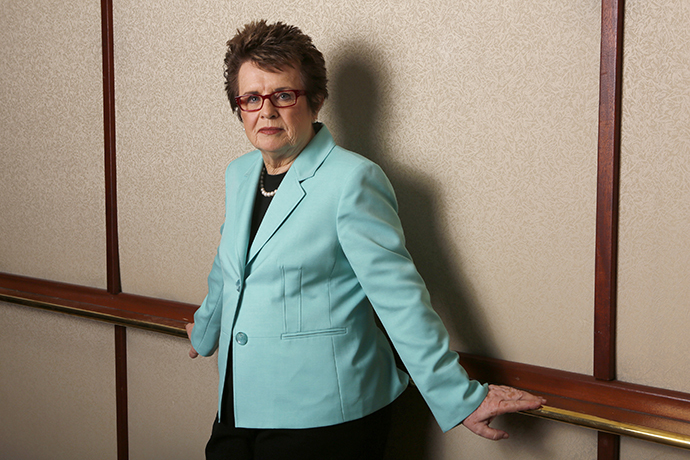
George Stephanopoulos:President Obama said he was offended by the act on gay propaganda. He has also recently said that if there are no gay sportsmen and sportswomen in Russia, its team will be weaker. However, if they start protesting, meaning gays and lesbians, will they be prosecuted under this anti-propaganda act if they decide to hold protest actions?
Vladimir Putin: … protest actions and propaganda are after all two slightly different things. They are similar but if we look at this from the legal point of view, a protest against a law is not propaganda of homosexuality itself or child sexual abuse. That is first point.
Second point, I would like to ask our colleagues – my colleagues and friends – before trying to criticize, to solve the problem in their own home first. But I have already said that it is well known. In some US states, homosexuality is criminally punishable. And how can they criticize us for a far gentler and more liberal approach to these issues compared to the one they have at home? However, I understand that it is difficult to do since there are a lot of people in the US itself that share the view that the laws of their state or of their country are just, reasonable and correspond with the sentiments of the larger part of its citizens. But we need to discuss this in some more appropriate international forums, to elaborate some common approaches. Anyway, we have got the message. And I am telling you that none of our guests will have any problems.
We remember how some African-American citizens of the US protested during the Olympic Games – a large-scale international competition – against segregation. I saw that myself on the TV screen. But that is all in all a general practice aimed at stating one’s rights.
Sergey Brilev:Vladimir Vladimirovich, if you would allow me to return to sport-related issues - you know, I remember that when London was getting ready for the Olympic Games, the British press made it seem as if something terrible was happening in the United Kingdom. And then a wonderful celebration of sport happened. Later on, however, when Mitt Romney, candidate for the US presidency, arrived in London and repeated the exact same things the London newspapers were writing, the latter rebuked him saying “do not dare, we will manage on our own, and we have a celebration of sport ahead of us”. And that is the kind of celebration that we now have ahead of us. The last time this country hosted the Olympic Games I was eight and I am sure that millions of people are expecting this large event.
You ski and play hockey; what competitions are you planning to attend? What are you planning to see, just for yourself? What results are you expecting from the Russian national team?
Vladimir Putin: I have already been asked this question. I can say that I will be able to attend competitions only on those days when I am free from the current work and this is not going to totally coincide with my sport preferences. But if I could go and see the competitions I am interested in, that would of course be hockey and alpine skiing. I would also watch with great pleasure biathlon and figure skating.
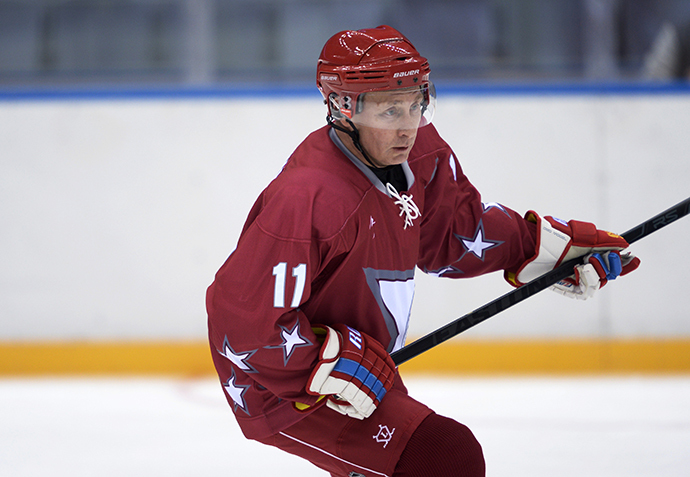
George Stephanopoulos:I was just wondering whether you and Barack Obama made a bet what country would get more medals: the U.S. or Russia?
Vladimir Putin: No, we never make such bets. Barack himself loves sports very much, I can see it, he pays due attention and not only to going in for sports, but also to the development of sport. Practically all American presidents as we can see pay great attention and act effectively, that is why the team of the United States traditionally achieves very good and impressive results. We wish success to our American friends, the American athletes. I know that a lot of people in our country, millions of people admire American athletes and truly sincerely love them. As I have already said I would like very much the sports not to be soiled by the politics. And I think that we all will benefit from this.
But, of course, first of all we will support our athletes. We traditionally have good results in winter sports. In previous years, because of the change of generations, and frankly, and I also have already spoken about it,because of the loss of training bases we had a certain failure, decline, including a not very bright performance in Vancouver, although in general there we performed in a proper manner. We expect that the situation will improve and that the scores, including the number of medals will grow. Although it is important, it is still much more important for us, for Russia, to create a favorable environment for the Games and to conduct them in a proper manner. And it is very important that our athletes have shown their worth, showed their character and skill.
And as far as the medals are concerned, it is also an essential element of any sports competition, including the Olympic one. But for me it is even more important to see that we have a viable, efficient team that holds promise.
Andrew Marr:Mr. President, before this sports festival starts there have been a lot of amnesties in Russia, in particular concerning the Greenpeace. Some critics say that you just "are making a forced smile".
Are these real liberal efforts in the framework of Russian policy or just such a step for popularity?
Vladimir Putin: What kind of answer do you want to hear from me?
Andrew Marr:I would like you to say, "I am a real liberal and hold liberal-views".
Vladimir Putin: It’s true. And one more thing, we adopted the Amnesty Law not in connection with the Olympics, but in honor of the 20th Anniversary of the Russian Constitution. That is first.
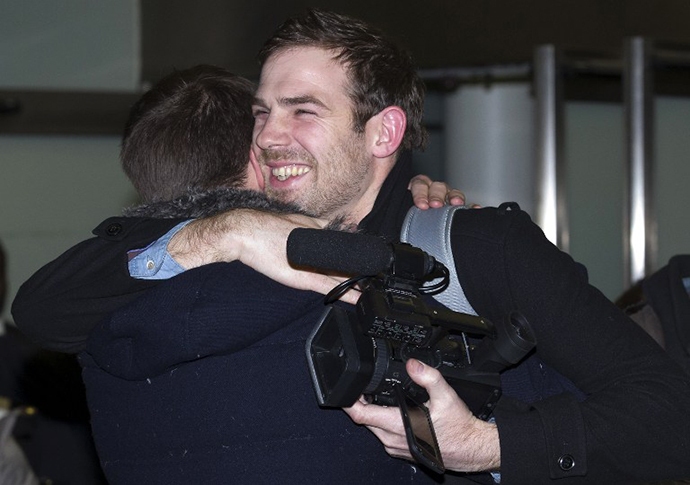
In the second place, in accordance with our law the decision on the amnesty was not made by the President. It is an exclusive prerogative of the Parliament. It is not me who made the decision on the amnesty, but the Parliament. So I "cannot make a forced smile". It is not my merit, but the merit of the deputies of the State Duma of the Russian Federation. But I certainly support this initiative and believe that it is correct. And in this connection I would like to note that we are probably record-holders for the number of amnesties concerned. Here we also should strike a certain balance between those who committed the crimes and the victims of these crimes. We talk a lot about the situation of the sentenced prisoners or persons under investigation. And that is correct, we should never forget about it, especially as the situation in the places of detention in our country, as well as abroad, by the way, in many countries, is not the best. But we should never push to the sidelines the people who became victims of the crimes. Here the position of the State towards these problems should be balanced.
Irada Zeynalova:Vladimir Vladimirovich, while we have been talking the storm has already become so strong that the mountains cannot be seen, it snows more and more. It turns out that the Winter Games, as well as the Summer ones, generally speaking, have one more organizer that is the weather. The weather forecast has reminded a guess lately. Unfortunately, the models do not work. Let's say, will we modify the weather during the Sochi Olympics or will we hope for a good luck? For example, in Turin a few days of competition were canceled just because of fog and because of snow. Will we do something with the weather so that the Games are on the schedule?
Vladimir Putin: No, we will do nothing. Unfortunately, we are and will always be dependent on nature. As you know, Australia, which is now hosting a major tennis tournament, is facing an extreme heat wave with temperature over 40°Cresulting in some competitors fainting from the heat. It started to snow rather unexpectedly here and if weather conditions do not meet the standards of the competition, the representatives of the International Olympic Committee will decide what to do about it. However, I do hope that the conditions will be favourable, as the weather data for many years show thatfrom the first half of February to the end of March, this region generally has very favourable weather for winter sports. I hope that despite all the fluctuations it will not be an exception this time.
Irada Zeynalova:So, we will not need the thousands of tons of snow that we have stored somewhere in the glaciers, will we?
Vladimir Putin: Well, it is obvious that there is no need for them now, but we have stored them just in case. We have seen major international winter competitions, say, skiing races, with just a narrow snow path for the skiers and green grass on both sides of it. Thank God, it is not the case here and I hope that it will not be.
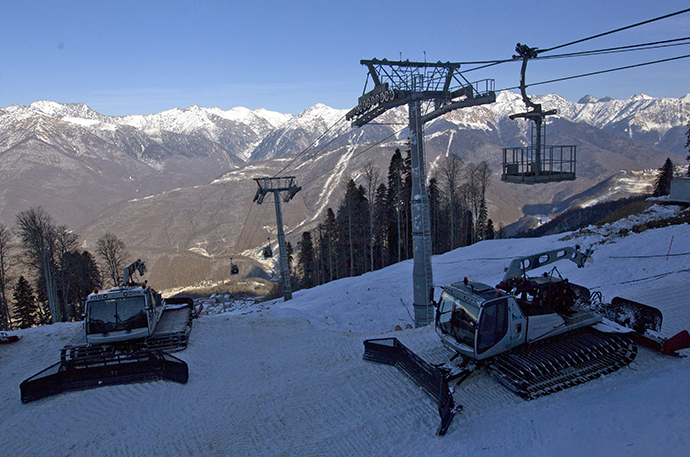
Junyi Shui:Mr President, as I have already said there have been many questions from Chinese people before my arrival. I have printed only a small part of them relating to the Games and you personally. China is not very strong in terms of winter sports. What results do you expect from the Chinese team at the Sochi Olympics? In addition, some wonder in what sport you perform worst yourself. In general, is there anything in the world that you do not know how to do? It seems that you have mastered everything.
Vladimir Putin: There is a famous saying: "The more I know, the more I realise that I know nothing." I think that it applies to all people, including me.
As for sports, I really love them, both winter and summer sports. The expectations as to China’s results, whether at Summer, or Winter Olympics, are usually high. China has developed an extremely efficient way of preparing and motivating its athletes. Note, it is very important that preparation go hand in hand with motivation.
I watched with great attention the way China grows a young generation of athletes, the way it selects them, the way they are trained and the way their psychological attitudes are shaped. There are plenty of lessons to learn there. With strong internal motivation like this people achieve maximum results.
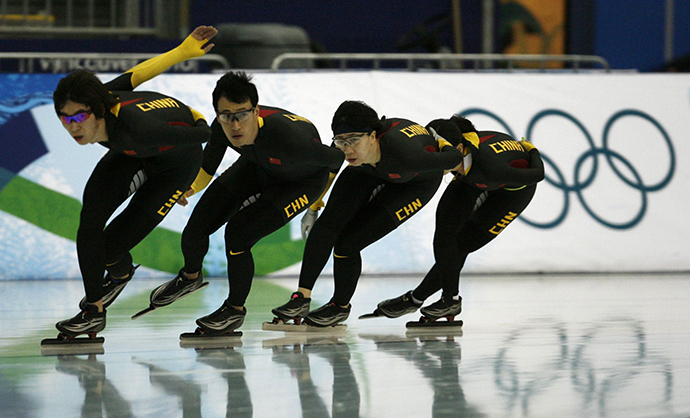
Certainly, China has traditionally developed summer sports rather than winter ones. Yet this is just a matter of adjusting the pattern. If China has made this adjustment or makes it in the near future, I believe that it will turn into a major competitor for those countries who have traditionally been developing winter sports. We expect that Chinese athletes will demonstrate spectacular performance. We look forward that they both please and surprise the winter sports lovers from around the world. They can do it.
Ed Hula:Is it important for the success of the Winter Olympics and for your satisfaction with the Games that Russian team wins a medal in ice hockey? How important is this to you?
Vladimir Putin: I should be honest, it does matter. Not for me personally, not to satisfy any ambition. Rather, it is important for the millions of our ice hockey fans. Ice hockey has traditionally been very popular in this country, and although it has been viewed as a Canadian sport, I believe it to be equally a Russian one. We are very grateful to Canadians for having invented this game, as well as to those who brought it to this country. It would be no exaggeration to say that ice hockey is loved by millions of people, with hundreds of thousands of people playing it and millions of people watching the matches. Certainly, ice hockey matches are always spectacular and memorable. I would like to stress that in ice hockey, just like in any other sport, we expect success and victory, yet what is most important is that excellence and character are demonstrated. It would be the main result that our sports and particularly ice hockey fans see that our athletes have made the best of their character, excellence and talent. Then nobody will reproach them for a failure to achieve a desired result. If they do achieve it, we will be very grateful to our athletes. Yet, let me repeat, there is no point in making any forecasts or prior assessments. We are very well aware of the fact that ice hockey has been developing all over the world and, which is of great pleasure to us, it has been developing in Europe. Finnish and Swedish teams have traditionally remained strong, with Switzerland and Germany making great advances, not to mention the United States and Canada. We would be very glad that these outstanding athletes come and show their talents here, in Russia. We are very grateful to all of our partners and to all of these prominent athletes. We would be very glad to see and to welcome them here and look forward to enjoying their game.
Junyi Shui:Mr President, let me change the subject of our conversation to the role of the Olympics for Russia. I have heard you calling the Olympics your baby, your project. I have also heard people saying that your contribution was a key factor why Russia has the chance to host them. You also mentioned that you could make Russia a strong and powerful country within 20 years. Is there a connection between Sochi Olympics and your vision of a strong Russia? Some media even say it is somehow linked to your future political career. Can you comment on that?
Vladimir Putin: As you know, there is a strong connection between the Olympic Games, the progress in sport and the successful development of a country in general, because great sport achievements are mostly a result of effective economic and social policies. Russia wanted to host the Olympic Games in 1994 and in early 2000s, but I believe it was obvious to both Russia and the International Olympic Committee that it was very hard for the country due to pure economic reasons. Russia’s GDP and household incomes have almost doubled and even though our gold and foreign currency reserves of over USD 500bn cannot match those of China, we still rank third in the world on this indicator. The Russian Government has two reserve funds. Over the recent years, we have nearly always had a surplus budget. Last year, we had just a meagre deficit of -0.5% per cent, which is insignificant. We have paid off all our external debts.The trade balance surplus is about USD 196bn, although I may be mistaken with exact figures. This means that our economic development and economic growth empower us to carry out such projects. We have become the fifth world economy not in terms of income per capita, but in terms of GDP and purchasing power parity. It is quite an achievement. Just like any other country, we have our difficulties, but the results achieved allow us to reach social goals, including those in the demographic sphere that we have already mentioned today. I would like to recall the fact that now the number of births in Russia is higher than the number of deaths for the first time in 20 years. It enables us to raise salaries in the social services sector, including health care and education. All these factors create a solid basis for sport achievements that, in turn, will positively influence the demographics. We may even seek progress in sport, including or even mostly, a means to create favourable demographic conditions and improve the health of the nation. Such major events as world championships, European championships and Olympic Games encourage people, especially young ones, to do sports, help to facilitate mass sport participation, which certainly has a positive impact on the health of the nation, and make sport popular, interesting, and fashionable. I believe all of this to be of extreme importance, it is not just my ambitions and it is the interests of the state and its people in their purest form. No doubt, it gives me great pleasure to see us do that, but again, not because of my ambitions.
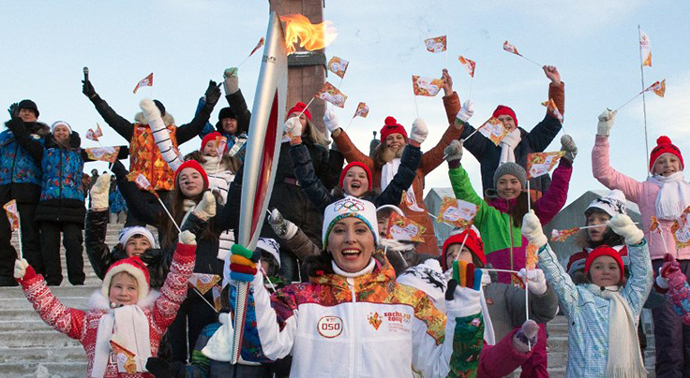
There is also a certain moral aspect here and there is no need to be ashamed of it. After the collapse of the Soviet Union, after the dark and, let us be honest, bloody events in the Caucasus, the society had a negative and pessimistic attitude. We have to pull ourselves together and realise that we can deliver large-scale projects on time and with high standards of quality, and by projects I mean not only stronger defence potential, but also developments in the humanitarian sphere, including in sport. I believe that all this is a step in the right direction, as it strengthens the morale of the nation, as well as its social and health care sectors and creates conditions for future development.
Junyi Shui:In your opinion, what image of Russia will the Sochi Olympic Games convey to the world, what history can they tell?
Vladimir Putin: I would like the participants, guests, journalists and all those who watch the Games on TV and learn about them from the mass media to see a new Russia, see its personality and its possibilities, take a fresh and unbiased look at the country. And I am sure that this will happen, it has to bring about good and positive results and it will help Russia to establish relations with its partners around the world.
Andrew Marr:You sound very convincing. You have been named third most influential person in the world, ahead of the Pope. Do you think it is possible for you to stand for election once again? Do you consider such a possibility? Or maybe someone has got bored?
Vladimir Putin: I believe one should not pay attention to such ratings. Besides, no person can get the better of the Pope. Such a comparison is irrelevant. The Pope is in charge of the biggest state in the world. The state which has no formal characteristics. How to say it in the modern language to put it correctly, this is a kind of a network state. You see? But it is real and not virtual, as there are quite a number of Catholics in the world, a billion people already. Besides, here we talk about spiritual influence which is more important than political one.
We have orthodox religious leaders as well. First of all, this is Patriarch Kirill of Moscow and All Russia. I have enormous respect for this person. He contributes a lot to the spiritual strengthening of our people, and not only the Orthodox, because he cooperates with other representatives of traditional Russian religions in order to promote interreligious and interethnic peace. So Russian Orthodox Church carries out great work in this respect which has positive results.
As for ratings, I reiterate that I do not think them important. The situation changes every day. One can never be guided by them. The most important thing in any sphere of activity is to feel that you are a professional and to constantly increase your level of expertise and the quality of your work.
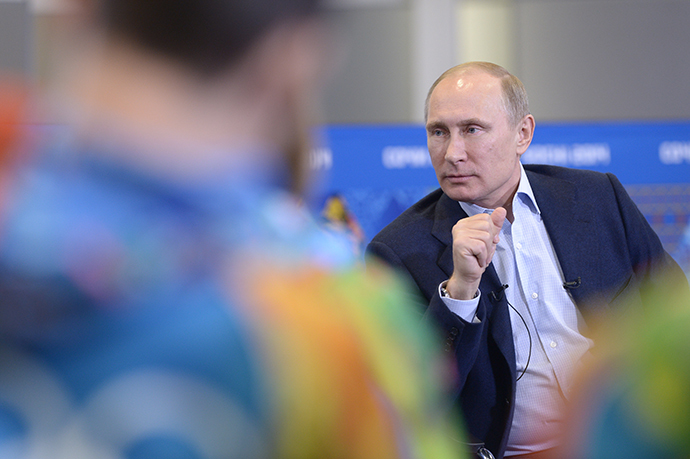
Concerning ambitions, it is too early to speak about this. We are in 2014 now; elections are to be held in 2018. It is necessary to work now, and then we will see. The worst and the most dangerous thing that can happen to a politician is holding on to power by all means and focusing only on this. In such a situation the failure is inevitable as you are always afraid of making a wrong step. This is not what you should think of; you should focus on the results of your work. Time will tell.
Sergey Brilev:Mr. Putin, let me speak about the future and the past at the same time. I was lucky to be in Guatemala when Sochi was chosen to host the Olympics. It was at that moment that our paralympians showed their worth so clearly.
Vladimir Putin: Yes.
Sergey Brilev:The future after the Olympics includes Paralympic Games.
Vladimir Putin: Right.
Sergey Brilev:I do not know if this was planned or not, but now the city of Sochi, and not only those exemplary parts of it that are intended for the Olympics, but also those that have fewer foreigners and more Russian people, as well as other Russian cities are becoming more friendly toward not only paralympians but disabled persons as well. This is quite visible. Much has to be done as the disabled still face many bitter things, but progress has started. Was this your intention when you brought in paralympians then?
Vladimir Putin: Yes, it was. Moreover, we have a federal programme on the so-called barrier free environment. Unfortunately, I have to admit that in creating such a barrier free environment we fall greatly behind many other countries of the world. I really regret it, but it developed like this since the Soviet times. And I am greatly pleased that we are leaving this negative tradition behind. We adopted the programme on a barrier free environment. It is being implemented differently in different regions, and this obviously requires additional financing. But I would really like Sochi to serve as an example of how the problem of a barrier free environment can be solved, this was my initial plan. Here this was done from scratch drawing upon the highest modern standards. And I reiterate that from the very beginning I wanted the programme on a barrier free environment in Sochi to become a good example for other Russian regions.
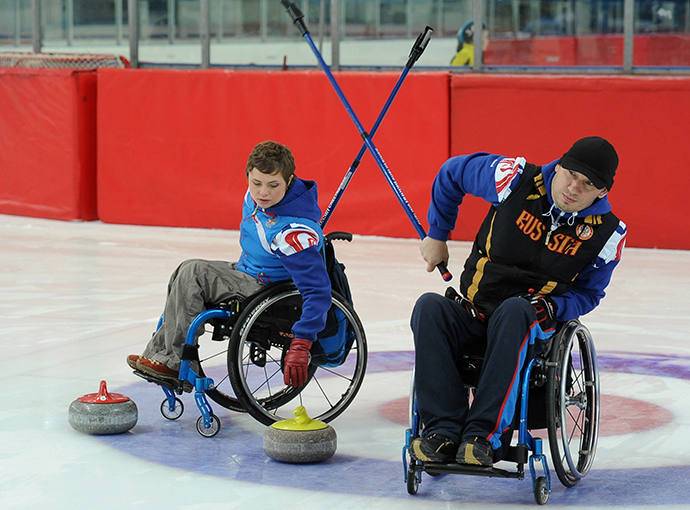
As for our paralympians, they are all outstanding athletes.I cannot but feel gratitude when I mention them, because they win more medals than our Olympic team. This is first, and it is very important. Secondly, it is actually quite obvious that they serve as an example for people with and without disabilities, example of how one can and should become strong morally to keep moving forward and enjoy life fully. Regretfully, our state is still far from meeting all the needs of the disabled people in the contemporary world. When our paralympians achieve outstanding results, by doing so they push the state to address those issues. I feel very grateful to them and, of course, I count on their brilliant performance during these Paralympic Games. By the way, many media do not pay enough attention to them… some more than others though. There is a small channel called RBC, I think, that provides a regular commentary on the paralympians. I do not see that on federal TV channels though.
SERGEY BRYLEV:I heard you, Vladimir Vladimirovich.
George Stephanopoulos:Since 2007 you invested so much in the Olympic Games. How would you measure success in Sochi? Will it influence your reputation and is it a question of honor for you?
Vladimir Putin: I want it to be a success of the country. As I said, we are hosts, and the goal number one for us… not in sports but for the state… is to create good conditions for athletes, guests, journalists, tourists so that people come to an international celebration of sports, a number one winter sports event this year, and be in the center of this celebration, so that millions of sports fans throughout the world feel it even if they are hundreds or thousands miles away from Sochi. This is our main task. Of course, people in Russia should also see that our country can hold such events and be a part of this celebration. This is first.
Another very important thing is that it should influence the development of mass sports in the country, it is one of the key goals. Of course, we expect good results from our athletes. This is not an exhaustive list, I mention only obvious things, but if all these elements are there, it will be a success. In a way, it would be my success as well as of the Russian Government, of the regional authorities, of all those who prepared and conducted this work, from builders, designers and engineers to common workers. Certainly, it will be their success, and I will be happy if all that is done properly. I am sure they will be happy as well. So, it is not going to be my personal success but of a whole country. I hope it will happen.
Irada Zeynalova:When you won the presidential elections, you came out to a square, and we all could see how emotional you were. Preparation of the Olympic Games is a much more complex and time-consuming task than any electoral campaign. Have you ever thought about March 18th, about how this supercomplex task would be fulfilled?
Vladimir Putin: No. I was thinking about the schedule to prepare this event. After that, I was thinking how to deal with the first, second, third stage of preparation, how well one thing is done and how we can address the other. I would say it was a general and a stage-by-stage approach towards dealing with the issues. I never thought much about how someone may look at it.
Irada Zeynalova:On March 18 everybody is leaving, you see off the guests and you finally get the time for a late celebration of New Year, like all people who were busy with Sochi Games. Did you think how to celebrate the New Year?
Vladimir Putin: No, I think there will be other things to be taken care of.
George Stephanopoulos:You said that it is necessary to promote fitness, sports. We know that you practice judo and play hockey. How do you stay in shape, is it important for you?
Vladimir Putin: How to control one’s weight? Don’t overeat. How to stay in shape? Practice sports. No magic pills here. I do something everyday. Yesterday I skied here till 1.30 am, today morning I exercised in a gym, I swim about 1000 meters almost every day. Nothing special, but on a regular basis. You know the saying, chicken pecks grain after grain.
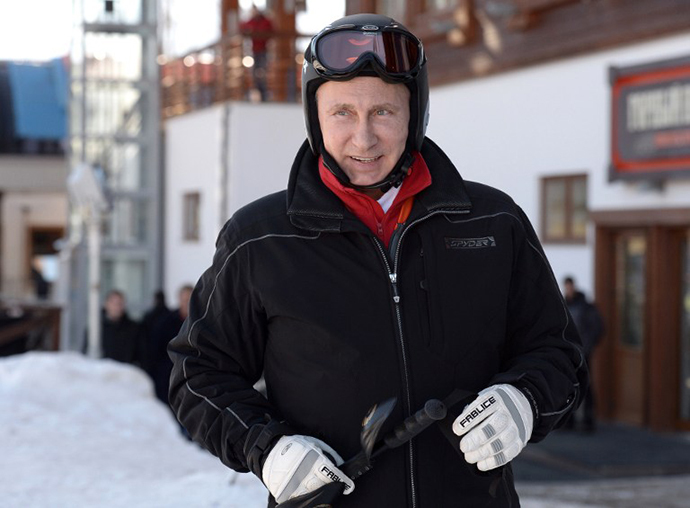
Junyi Shui:I also have a personal question which was also asked by Chinese Internet users. Have you thought about what you are going to do when you retire? Chinese users believe that you are very handsome and masculine. Maybe you will play tough guys in cinema?
Vladimir Putin: That’s unlikely. Maybe I will play hockey. We have recently created our own NHL. It is not called National Hockey League but Night Hockey League where non-professional 40+ people can play. I was very glad to see that this initiative is followed throughout the Russian Federation. Teams are now created in every region, they hold competitions, and the final is held in Moscow or in Sochi, like it was last year. More than a hundred teams arrived from all Russia’s regions. Two and a half years ago I was not able to stand on skates at all. You may have seen that now I am already trying to do something. That’s what I like. If and when I retire, I will try to do things that I like.
Junyi Shui:Thank you.



